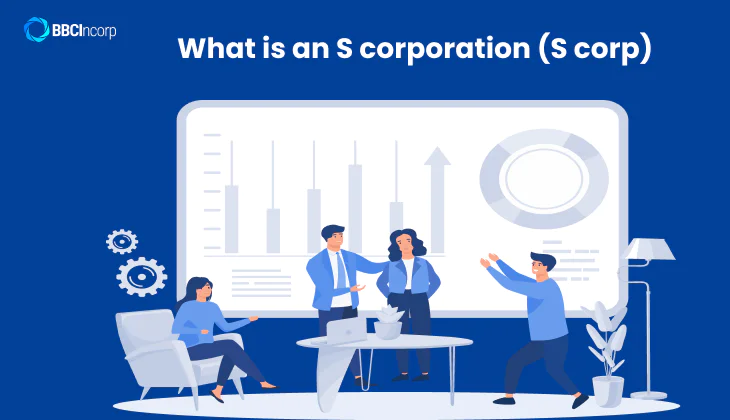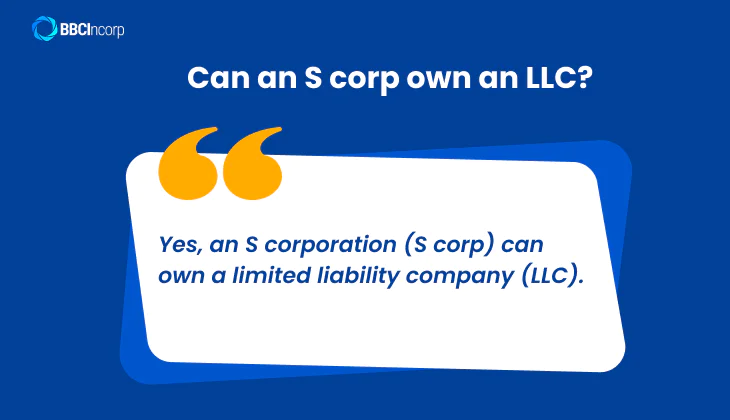
Table of Contents
The American business landscape thrives on the flexibility and strategic advantages offered by corporations and limited liability companies. According to the IRS, over 5 million businesses in the U.S. currently operate as S corporations, leveraging their pass-through taxation. Simultaneously, LLCs, prized for their management flexibility and liability protection, continue to proliferate. This dual appeal often leads entrepreneurs to explore combined structures.
A key question then arises: Can an S corp own an LLC? And if so, what are the implications and mechanics of such an arrangement? This article will delve into the complexities of this relationship, providing practical guidance for aspiring business owners.
What is an S corporation (S corp)?
An S corporation in the U.S. is not a business structure itself, but rather a tax election available to eligible corporations or LLCs. It’s governed by Subchapter S of the Internal Revenue Code. By filing Form 2553 with the IRS, a qualifying business can elect to be taxed as an S corporation.

Benefits of an S corporation
The most significant benefit of an S corp is that it is a pass-through entity. The business can bypass corporate-level income tax, which is a key distinction from C corporations. Instead, profits and losses “pass through” to the shareholders’ personal income tax returns.
Shareholders will only pay taxes once on the business’s profits. While all profits are taxed, a portion can be distributed as dividends, which are not subject to self-employment tax. This can lead to substantial savings compared to sole proprietorships or partnerships.
This pass-through taxation is a fundamental aspect to consider when discussing an S corp owning an LLC, as it affects how income is distributed and taxed within the combined structure. Moreover, forming a corporation enhances your credibility, projecting professionalism to clients and partners, and fostering trust.
S corp forming requirements
To qualify for the S corp status, a business must adhere to strict IRS guidelines such as:
- Domestic entity: The business must be a domestic corporation organized in the U.S.
- Eligible owners: Shareholders must be individuals, certain trusts, or estates.
- Owner restrictions: Partnerships, corporations, non-resident alien shareholders, certain financial institutions, insurance companies, and domestic international sales corporations are not permitted.
- Shareholder limit: The entity cannot have more than 100 shareholders.
- Single stock class: The corporation must have only one class of stock, although differences in voting rights are allowed.
- Eligible business type: The corporation cannot be an ineligible corporation, such as certain financial institutions, insurance companies, and domestic international sales corporations.
- Formal election: To elect S corporation status, the corporation must file Form 2553 with the IRS, with full shareholder consent.
In addition to federal requirements, businesses must also comply with state tax laws. S corporation status at the federal level doesn’t automatically grant the same status at the state level. Each state has its own rules regarding S corporations.
Regarding the main question: Is it possible if an S corp owns LLCs? Yes, an S corporation can own an LLC. An LLC is a flexible business structure that facilitates ownership by various entities, including individuals, corporations, and other LLCs. For more details, let’s move on to the next sections.
What is a Limited Liability Company (LLC)?
A Limited Liability Company (LLC) is a business structure that combines the limited liability of a corporation with the operational flexibility of a partnership or sole proprietorship.

Benefits of an LLC
Governed by state laws, it provides a legal shield, separating the owners’ personal assets from the business’s debts and obligations. The key advantage of an LLC is limited liability protection. This option safeguards members’ personal assets since the business operates as a separate legal entity.
Beyond liability protection, LLCs grant management flexibility. Owners can choose between member-managed or manager-managed structures. Compared to corporations, LLCs maintain fewer formal requirements.
Tax flexibility is a further advantage. Single-member LLCs are typically treated as disregarded entities, while multi-member LLCs are taxed as partnerships, with profits and losses passing through to individual tax returns. LLCs can also elect corporate taxation if preferred.
LLC forming requirements
The requirements for forming an LLC vary from state to state, but they generally include:
- Choosing a business name: Your LLC name must be unique and distinguishable from existing business names within your chosen state. Most states require the name end with a designator like “LLC” or “Limited Liability Company”.
- Designating a Registered Agent: Every LLC must have a registered agent who is responsible for receiving legal and official documents on the company’s behalf. The registered agent must have a physical address within that state. You can act as your own registered agent or hire a professional registered agent service
- Minimum number of members: Most states allow for single-member LLCs, so you must have at least one person or entity to form an LLC.
- Creating an Article of Incorporation: While not always legally required, an Article of Incorporation agreement is highly recommended. This document outlines the LLC’s internal operating procedures, member responsibilities, and profit/loss distribution.
Unlike an S corp, there is no limit to the number of members that an LLC can have, and there are no citizenship requirements for owners as well.
See More
Choosing between an LLC or S Corp for real estate agent status can impact your taxes, liability, and business growth. Want to make the best choice for your real estate business? Read our full guide on LLC or S Corp for real estate agent.
Can an S corp own an LLC?
“Yes, an S corporation (S corp) can own a limited liability company (LLC). ”

IRS regulations permit this ownership, provided the LLC’s activities align with the S corp’s eligibility requirements. This includes maintaining the S corp’s shareholder limits and avoiding prohibited income types.
Can S corp own LLC? When it comes to S corp owning LLC structures, there are several possible cases:
- Single-member LLC owned by an S corp
- Multi-member LLC with S corp participation
- An S corp acting as a holding company for multiple LLCs
- S corp establishing an LLC as a subsidiary to manage a specific function
- S corp investing in an LLC as a passive member
Here’s a closer look at each scenario:
Can an S Corp own a Single-Member LLC?
An S corp can establish a single-member LLC, a structure that, for federal tax purposes, is treated as a disregarded entity.
How it works
When an S corp forms a single-member LLC, the IRS treats this LLC as a “disregarded entity” for federal income tax purposes. This means that, from the IRS’s perspective, the LLC is essentially an extension of the S corp itself. The LLC’s assets, liabilities, and activities are considered part of the S corp’s overall operations.
Purpose
One of the primary reasons an S corp might choose to own a single-member LLC is for asset protection. After placing specific assets, such as real estate or intellectual property, within the LLC, the S corp can shield those assets from potential liabilities associated with other aspects of its business. If the S corp faces a lawsuit related to its primary operations, the assets held within the single-member LLC are generally protected.
Another purpose is to segregate specific business activities. The S corp is able to manage different aspects of its business as separate entities, which can be useful for organizing complex operations or testing new business ventures. Additionally, it can simplify tax planning, as the S corp can more easily track the income and expenses associated with specific activities.
Tax implications
Because the single member LLC owned by S corp is a disregarded entity, its income and expenses are directly reported on the S corp’s federal tax return. There’s no need for the LLC to file a separate federal tax return. This simplifies tax compliance and reduces administrative burdens.
This structure allows the S-corp to keep the pass through taxation of the S-corp, while also having the liability protection of an LLC. Indeed, it is one of the main reasons that an S-corp will choose to create this type of structure.
Can an S corporation own a multi-member LLC?
“Yes, an S corporation (S corp) can also hold an ownership stake in a multi-member limited liability company (LLC).”
How it works
In this scenario, the S corp becomes one of the members of the multi-member LLC, sharing ownership with other individuals or entities. The S corp’s ownership percentage determines its proportional share of the LLC’s profits, losses, and management rights.
This decision lets the S corp participate in the LLC’s activities while maintaining its own separate legal and tax structure. The arrangement is governed by the LLC’s operating agreement, which outlines the rights and responsibilities of each member.
Purpose
This structure is frequently employed in joint ventures or partnerships where the S corp seeks to collaborate with other businesses or individuals.
By joining forces, the S corp can pool resources, share expertise, and expand its market reach. This is particularly beneficial for projects that require specialized skills or significant capital investment. For example, an S corp specializing in software development can partner with a marketing firm through a multi-member LLC to launch a new product. Each party can simply focus on its core competencies while sharing the risks and rewards of the venture.
Tax implications
For federal income tax purposes, a multi-member LLC is typically treated as a partnership.This means that the LLC itself does not pay income tax. Instead, the LLC’s profits and losses are “passed through” to its members, who report their respective shares on their individual tax returns.
In the case of an S corp member, the corporation receives its share of the LLC’s income, deductions, and credits. These items are then incorporated into the S corp’s own tax return and ultimately passed through to its shareholders.
This pass-through taxation avoids double taxation, as the LLC’s profits are taxed only once at the member level.
Can an S corp own multiple LLCs?
The IRS does not impose a limit on this, granting an S corporation the flexibility to own as many limited liability companies as are necessary for its operational needs and asset management.
How it works
An S corp can structure its holdings by utilizing a holding company model or creating multiple LLC subsidiaries. Each subsidiary can be designated for a specific business activity or asset, such as real estate holdings, intellectual property management, or the operation of distinct business lines.
Purpose
Owning multiple LLCs is particularly advantageous for S corporations aiming to diversify their business operations or safeguard specific assets. In this way, the S corp effectively isolates potential liabilities and tailors management strategies to align with each entity’s unique operational requirements.
For example, an S corp might choose to establish one LLC dedicated to managing its real estate holdings while another focuses on its research and development initiatives. This not only facilitates focused management but also a clear delineation of responsibilities across the organization.
Tax implications
The tax treatment of these multiple LLCs depends on their classification. If the LLCs are treated as disregarded entities, their income flows directly to the S corp, which then passes it through to its shareholders. However, if the LLCs are treated as partnerships or corporations, they must file separate tax returns. The S corp must report its share of the income on its own return.
Please keep in mind that each LLC may incur varying state-level taxes and fees, depending on its location. Therefore, both federal and state tax implications should be considered to answer the question can an S-corp own an LLC and, specifically, multiple LLCs.
Why would an S Corp own an LLC?
Having explored the diverse scenarios that arise when an S corp owns LLCs, it’s time to distill the core advantages that make this a compelling strategy.
Asset protection
Imagine an S corp that operates a construction business. It also owns several rental properties. To protect these properties from potential lawsuits related to the construction business, the S corp creates an LLC to hold the real estate. Should a lawsuit occur against the construction arm, the rental properties remain shielded.
Tax optimization
Consider an S corp with fluctuating income. During high-profit years, the LLC’s flexible profit distribution helps the entity to distribute a portion of profits as dividends, reducing self-employment taxes. In leaner years, the company can then retain more profits within the LLC for reinvestment.
Growth through expansion
An S corp that sells software wants to test a new market for hardware products. Instead of risking the core software business, it forms an LLC to launch the hardware line. The business is able to explore the new market while keeping potential losses contained within the LLC.
Streamlined acquisitions
An S corp wants to acquire a smaller competitor. Instead of merging the competitor directly into itself, it creates an LLC to acquire and manage the competitor. This simplifies the integration process, allowing for a phased approach and minimizing disruption to the S corp’s existing operations.
Ultimately, the choice to have multiple or an LLC under S corp ownership represents a carefully considered move.
Can an LLC own an S corp?
Let us consider a reverse situation: Can an S corp be owned by an LLC?
Generally, direct LLC ownership of an S corporation is prohibited due to IRS shareholder restrictions. However, exceptions exist in specific scenarios, particularly involving single-member LLCs.
Single-member LLC as a disregarded entity
“Yes, if the LLC meets several criteria.”
When a single-member LLC operates as a disregarded entity for federal tax purposes, it’s essentially treated as an extension of its owner. This means the IRS looks through the LLC to the individual owner.
If the individual owner meets the S corp shareholder criteria, such as being a U.S. citizen or resident and adhering to the one class of stock rule, they can effectively own the S corp through the LLC.
Additionally, while disregarded entity status simplifies tax reporting, all net income generated by the LLC is subject to self-employment taxes. This can significantly increase the owner’s tax liability, as all profits are treated as earned income.
Therefore, while this structure offers operational simplicity, the question “Can a single member LLC own an S corp?” must be calculated based on the particulars of your venture.
LLC electing corporate taxation
“In this case, the answer is no.”
Should an LLC elect corporate tax status, whether as a C corporation or theoretically as an S corp if eligible, it transforms into a distinct legal entity. This election removes the disregarded entity status, thus eliminating the possibility of the LLC owning an S corp.
The IRS’s shareholder restrictions prevent corporations, including LLCs taxed as corporations, from being S corp shareholders. This fundamental rule is designed to maintain the integrity of the S corp structure.
Start your business with BBCIncorp in Delaware
Unlock the advantages of Delaware for your business with BBCIncorp’s expert formation and compliance services. From S corporations owning LLCs to standalone LLCs or corporations, we guide you through Delaware’s business-friendly environment.
Our expert team manages all aspects of your Delaware business setup:
- Expedited registration
- Ongoing compliance, including annual obligations
- Streamlined banking integrations with Wise and Payoneer
- Comprehensive offshore company formation services, including accounting, bookkeeping, renewal services, and many more per your business needs.
Why Delaware?
Delaware is a leading U.S. jurisdiction for business formation, offering significant advantages. These include no corporate tax on foreign-derived income, no sales tax, and no investment income tax for holding entities. Furthermore, its privacy protections and efficient incorporation process are particularly beneficial for global enterprises, especially those, like Amazon businesses, seeking strategic structuring.
Learn More
About our Delaware business formation services today.
Conclusion
Can an S corp own an LLC? Ultimately, yes. S corporations can strategically own LLCs for benefits like asset protection and tax flexibility, employing structures like single-member or multi-member ownership. Conversely, LLC ownership of S corporations is largely restricted, except for disregarded single-member LLCs.
Nevertheless, understanding IRS rules and tax implications is vital. Global entrepreneurs should, therefore, ensure proper implementation by carefully planning and consulting with professionals like BBCIncorp.
For personalized guidance on setting up your Delaware LLC or corporation, reach out to our experts today at service@bbcincorp.com.
Disclaimer: While BBCIncorp strives to make the information on this website as timely and accurate as possible, the information itself is for reference purposes only. You should not substitute the information provided in this article for competent legal advice. Feel free to contact BBCIncorp’s customer services for advice on your specific cases.
Industry News & Insights
Get helpful tips and info from our newsletter!
Stay in the know and be empowered with our strategic how-tos, resources, and guidelines.





